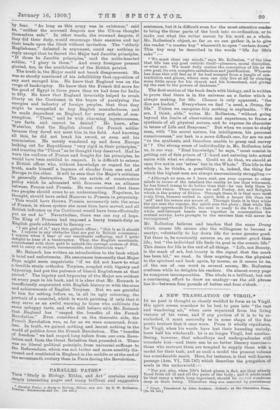PARALLEL PATHS.* This "Study in Biology, Ethics, and Art" contains
many .deeply interesting pages and many brilliant and suggestive
Parallel Paths a Study in Biology, Ethics, and Art, By T. W. Bolleiton. -London : Duckworth and Co. [te. net.] sentences, but it is difficult even for the most attentive reader to bring the three parts of the book into co-ordination, or to make out what the writer means by his work as a whole. Mr. Rolleston's object, so far as we can gather it, is to give the reader "a master key" wherewith to open "certain doors." This key may be described in the words "life for life's sake" :— " We must clear our minds," says Mr. Rolleston, "of the idea that life has any goal outside itself--pleasure, moral discipline, or what not. We must fully realise the conception of life as its own goal, its own complete satisfaction and justification. Whoever has done this will feel as if he had escaped from a jungle of con- tradiction and gloom, where man can only live at all by clearing some little space for his church and his homestead, and giving up the rest to the powers of darkness."
The first section of the book deals with biology, and is written to prove that there is in the universe an x factor which is always making for life. Chance is only apparent; "the dice are loaded." Everywhere we find "e, need, a Drang, for life." Unless we recognise this nothing la explicable. "We are, I think, able," writes Mr.. Rolleston, "without going beyond the limits of observation and experience, to frame a synthesis of all physical nature, and to express its character in terms of Life and Response." But when we come to study man, with "his moral nature, his intelligence, his personal consciousness," our task is a more difficult one, for are we not "in the synthesis, and therefore unable to grasp and survey it" F Our strong sense of individuality is, Mr. Rolleston tells us, in our way. "Real knowledge," he says, "must consist in getting out of this prison of '1 '-heod and entering into actual union with what we observe. Could we do that, we should at once live not in our 'selves' but in the Whole." This life inthe whole is, he thinks, a possibility ; is, indeed, the thing for which the highest men are always unconsciously struggling "Although no man, as I have said, can over express to other minds in terms of the intellect the reality he has thus witnessed, he has found means to do bettor than this—he can help them to share his vision. These means we call Poetry, Art, and Religion which is the poetry of Ethics. Through these it is that man moat truly lives, because united in spirit with a larger life than his 'self' and his senses are aware of. Through them it is that while the eye sees the sunrise, the spirit sees the glory; that while the intellect apprehends Truth, the soul is ready to die for It; that while self-interest bands men together in communities for mutual service, Love prompts to the services that will never be recompensed."
Mr. Rolleston believes and teaches that the same Drang which causes life causes also the willingness to become a martyr, voluntarily to lay down life for some greater good. Yet there is, he constantly assures us, no greater good than life; but "the individual life finds its goal in the cosmic life." This desire for life is the end of all things. "Life, not Beauty, is the mark of art, but beauty is the signal that the mark has been hit," we read. In thus arguing from the physical to the spiritual and back again, by means, as it seems to us, of the use of one word in several senses, Mr. Rolleston confuses while he delights his readers. On almost every page he compares incomparables. The whole is a brilliant, but not a convincing, effort to draw an analogy—as the old phrase has it—between four pounds of butter and four o'clock. ,




































 Previous page
Previous page